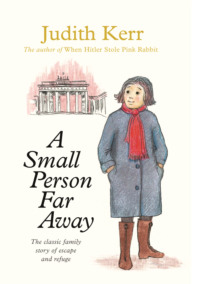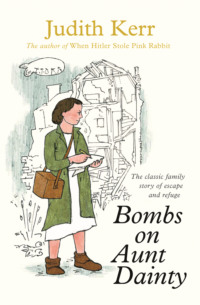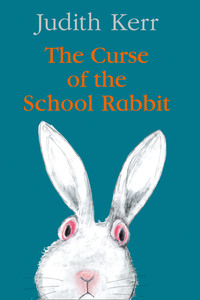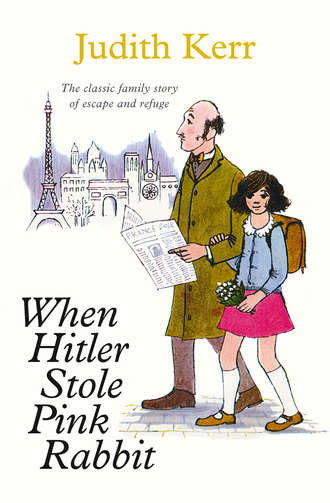
Полная версия
When Hitler Stole Pink Rabbit
‘I wasn’t going to kick the bucket!’ said Anna indignantly.
‘Well, I knew you weren’t, of course,’ said Max, ‘but that Swiss doctor has a very gloomy imagination. Do you want to go back to bed now?’
‘I think I do,’ said Anna. She was feeling rather weak and Max helped her across the room. When she was safely back in bed she said, ‘Max, this … confiscation of property, whatever it’s called – did the Nazis take everything – even our things?’
Max nodded.
Anna tried to imagine it. The piano was gone … the dining-room curtains with the flowers … her bed … all her toys which included her stuffed Pink Rabbit. For a moment she felt terribly sad about Pink Rabbit. It had had embroidered black eyes – the original glass ones had fallen out years before – and an endearing habit of collapsing on its paws. Its fur, though no longer very pink, had been soft and familiar. How could she ever have chosen to pack that characterless woolly dog in its stead? It had been a terrible mistake, and now she would never be able to put it right.
‘I always knew we should have brought the games compendium,’ said Max. ‘Hitler’s probably playing Snakes and Ladders with it this very minute.’
‘And snuggling my Pink Rabbit!’ said Anna and laughed. But some tears had come into her eyes and were running down her cheeks all at the same time.
‘Oh well, we’re lucky to be here at all,’ said Max.
‘What do you mean?’ asked Anna.
Max looked carefully past her out of the window.
‘Papa heard from Heimpi,’ he said with elaborate casualness. ‘The Nazis came for all our passports the morning after the elections.’
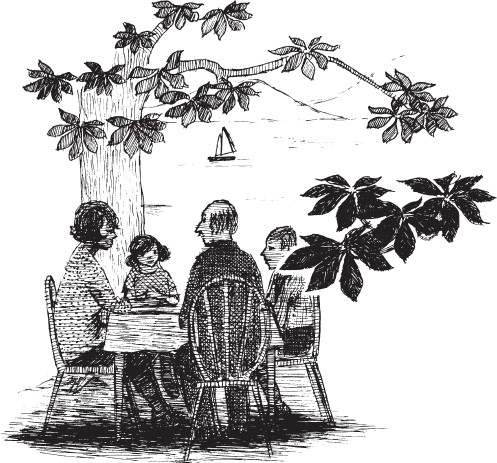
Chapter Six
As soon as Anna was strong enough they moved out of their expensive hotel. Papa and Max had found an inn in one of the villages on the lake. It was called Gasthof Zwirn, after Herr Zwirn who owned it, and stood very near the landing stage, with a cobbled courtyard and a garden running down to the lake. People mostly came there to eat and drink, but Herr Zwirn also had a few rooms to let, and these were very cheap. Mama and Papa shared one room and Anna and Max another, so that it would be cheaper still.
Downstairs there was a large comfortable dining room decorated with deers’ antlers and bits of edelweiss. But when the weather became warmer tables and chairs appeared in the garden, and Frau Zwirn served everybody’s meals under the chestnut trees overlooking the water. Anna thought it was lovely.
At weekends musicians came from the village and often played till late at night. You could listen to the music and watch the sparkle of the water through the leaves and the steamers gliding past. At dusk Herr Zwirn pressed a switch and little lights came on in the trees so that you could still see what you were eating. The steamers lit coloured lanterns to make themselves visible to other craft. Some were amber, but the prettiest were a deep, brilliant purply blue. Whenever Anna saw one of these magical blue lights against the darker blue sky and more dimly reflected in the dark lake, she felt as though she had been given a small present.
The Zwirns had three children who ran about barefoot and, as Anna’s legs began to feel less like cotton wool, she and Max went with them to explore the country round about. There were woods and streams and waterfalls, roads lined with apple trees and wild flowers everywhere. Sometimes Mama came with them rather than stay alone at the inn. Papa went to Zurich almost every day to talk to the editors of Swiss newspapers.
The Zwirn children, like everyone else living in the village, spoke a Swiss dialect which Anna and Max first found hard to understand. But they soon learned and the eldest, Franz, was able to teach Max to fish – only Max never caught anything – while his sister Vreneli showed Anna the local version of hopscotch.
In this pleasant atmosphere Anna soon recovered her strength and one day Mama announced that it was time for her and Max to start school again. Max would go to the Boys’ High School in Zurich. He would travel by train, which was not as nice as the steamer but much quicker. Anna would go to the village school with the Zwirn children, and as she and Vreneli were roughly the same age they would be in the same class.
‘You will be my best friend,’ said Vreneli. She had very long, very thin, mouse-coloured plaits and a worried expression. Anna was not absolutely sure that she wanted to be Vreneli’s best friend but thought it would be ungrateful to say so.
On Monday morning they set off together, Vreneli barefoot and carrying her shoes in her hand. As they approached the school they met other children, most of them also carrying their shoes. Vreneli introduced Anna to some of the girls, but the boys stayed on the other side of the road and stared across at them without speaking. Soon after they had reached the school playground a teacher rang a bell and there was a mad scramble by everyone to put their shoes on. It was a school rule that shoes must be worn but most children left them off till the last possible minute.
Конец ознакомительного фрагмента.
Текст предоставлен ООО «ЛитРес».
Прочитайте эту книгу целиком, купив полную легальную версию на ЛитРес.
Безопасно оплатить книгу можно банковской картой Visa, MasterCard, Maestro, со счета мобильного телефона, с платежного терминала, в салоне МТС или Связной, через PayPal, WebMoney, Яндекс.Деньги, QIWI Кошелек, бонусными картами или другим удобным Вам способом.





